
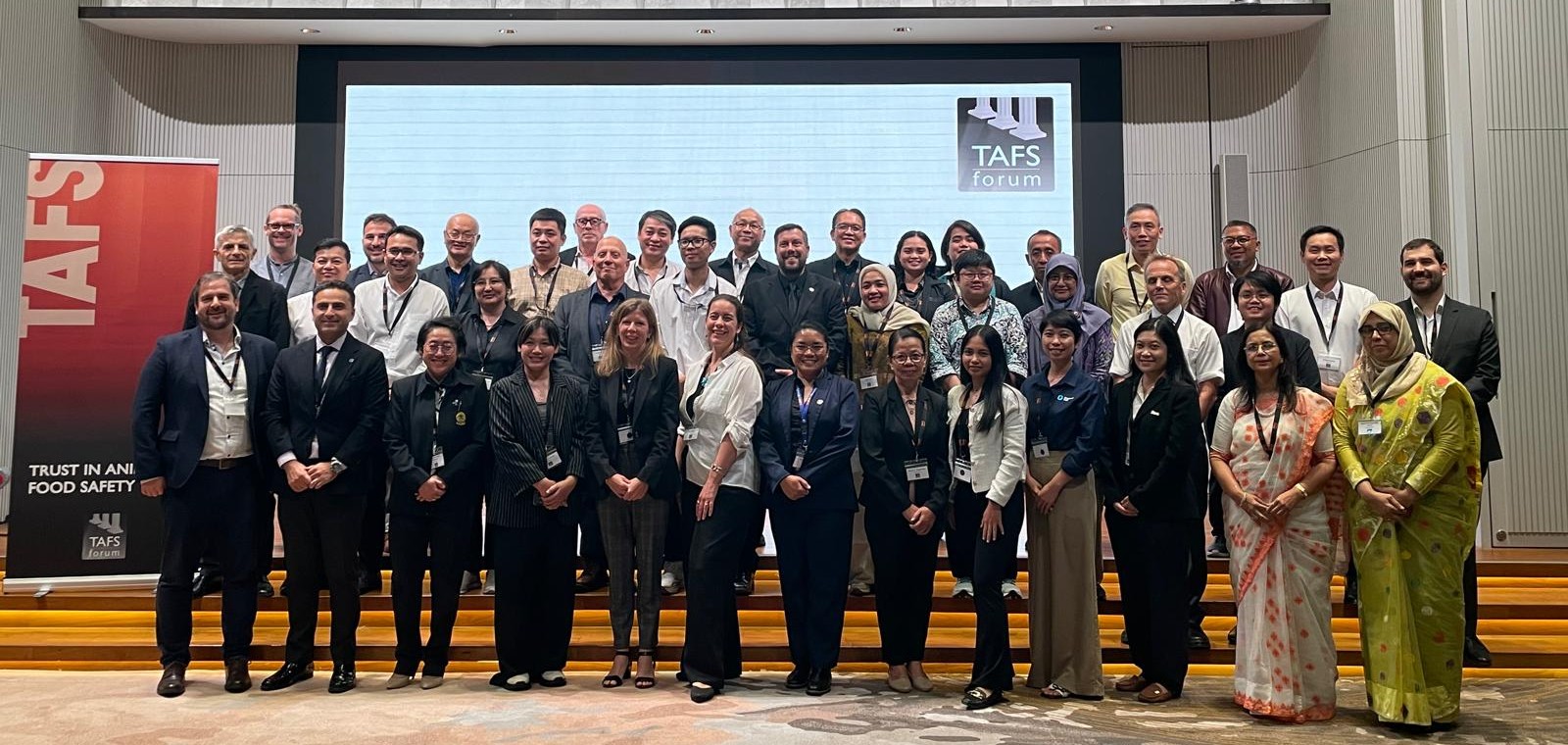
The workshop “Right Tools, Real Impact: Evaluation and Use of FMD Vaccines and Diagnostics in the Field”, held on November 4–5,2025, in Bangkok, Thailand, brought together more than 50 stakeholders from the public and private sectors across Asia and beyond.
The two-day event aimed to strengthen FMD control capacity by highlighting the importance of high-quality vaccines and diagnostics. It fostered the exchange of practical experience, scientific insights, and field expertise through technical presentations, open discussions, and group exercises.
The opening session highlighted the challenges of FMD control and clarified what defines a high-quality control tool, as well as how to assess its suitability and effectiveness for field application.
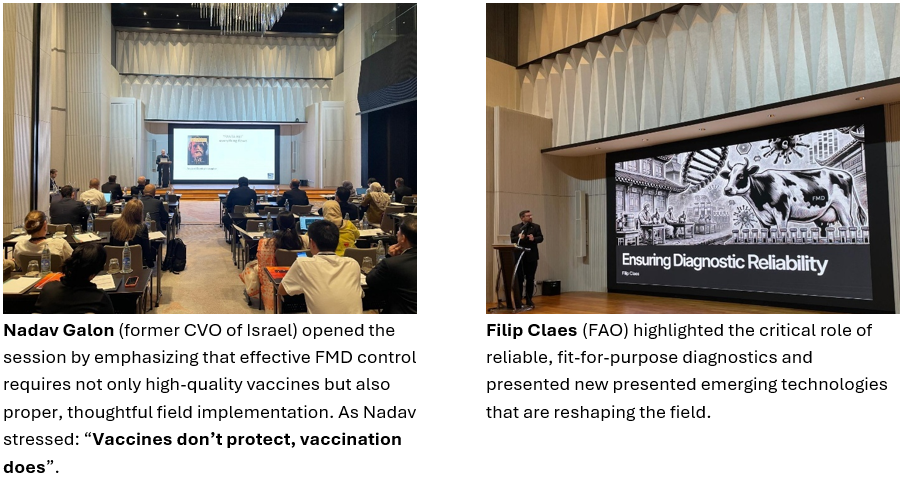
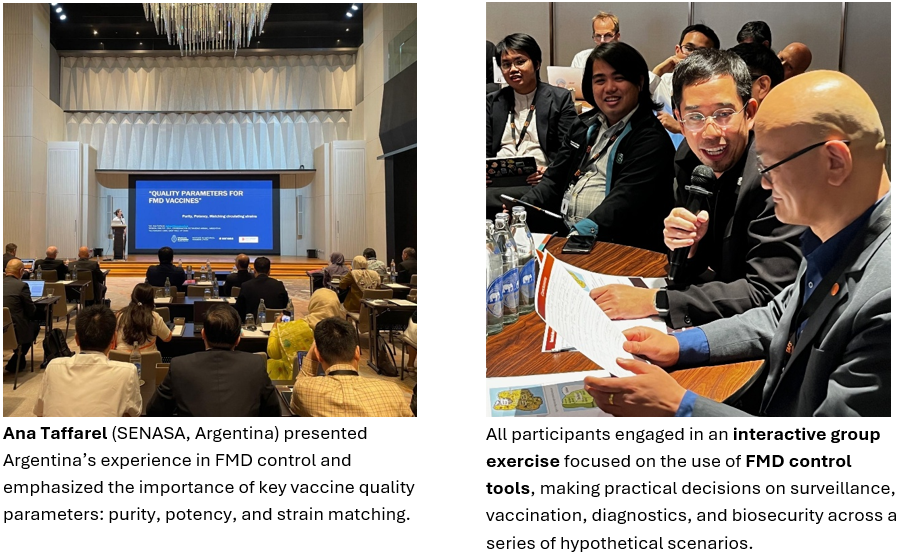
The second session examined the international regulatory framework for FMD vaccines and diagnostics. It highlighted the gap between meeting minimum standards and ensuring tools are truly fit for purpose in complex field conditions.
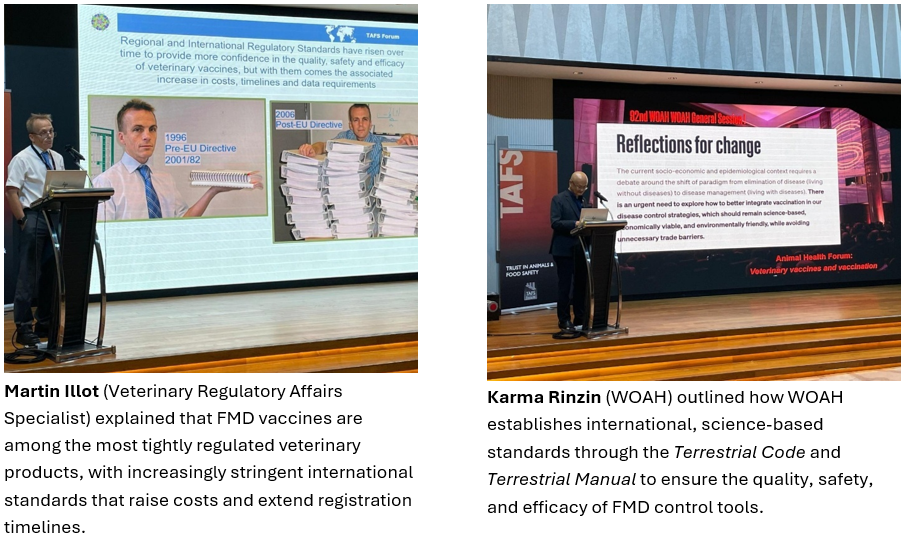
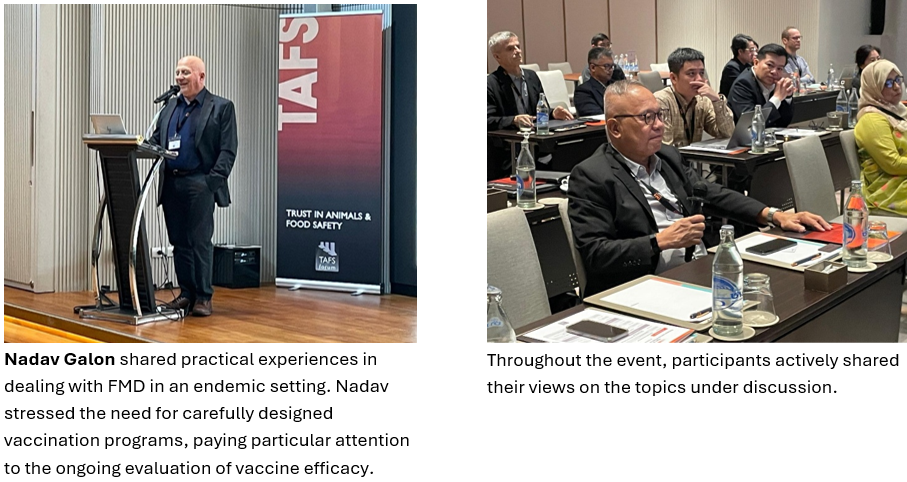
The third session focused on the application of high-quality FMD control tools in the field, addressing real-world implementation challenges and strategies to enhance preparedness and response.
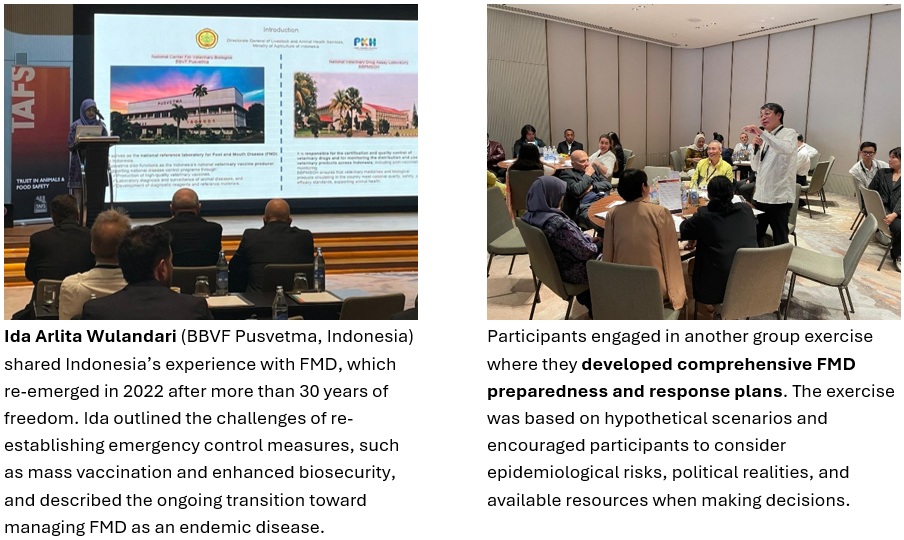
The fourth and final session focused on strategic approaches to ensure sustainable and effective FMD control through enhanced investment in high-quality tools, stakeholder collaboration and continuous improvement.
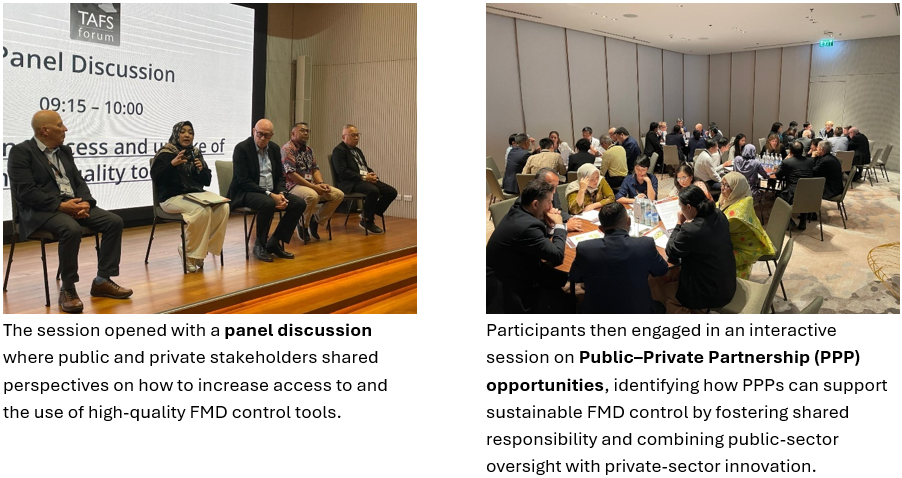
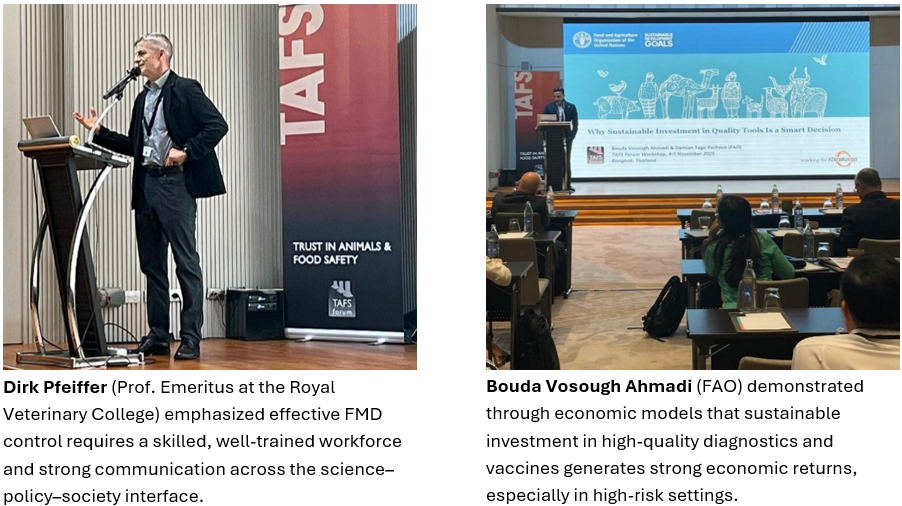
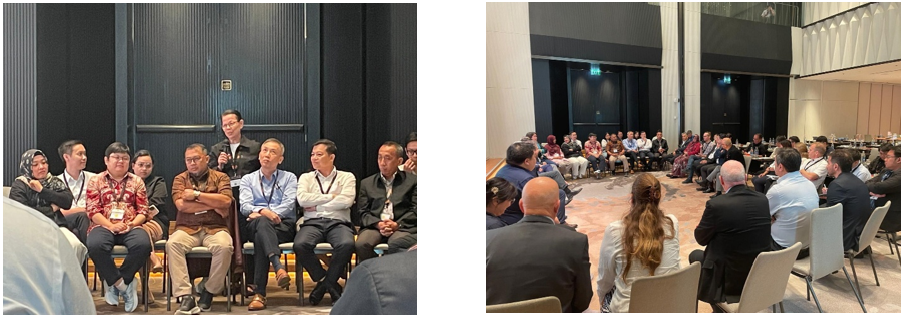
The session concluded with a group discussion, aimed at generating ideas on how to foster an enabling environment for the effective use of FMD tools.
The TAFS Workshop n Bangkok reaffirmed the shared commitment of public and private stakeholders to strengthen FMD control through high-quality tools, evidence-based strategies, and enhanced collaboration. The event underscored the critical role of PPPs, continuous workforce development, and regional cooperation in building sustainable, resilient, and adaptive FMD control programs.
Nadav Galon: The right tools for real impact -why quality matters
Ana Taffarel: Quality parameters for FMD vaccines
Filip Claes: Ensuring diagnostic reliability
Martin Illot: International standards for high quality FMD vaccines
Karma Rinzin: WOAH International standards for quality control and evaluation
Nadav Galon: Practical Experiences in Evaluation and Tool Selection
Ida Arlita Wulandari: Indonesia´s experience in controlling FMD
Bouda Vosough Ahmadi: Sustainable investment in quality tools a smart decision
Dirk Pfeiffer: Continuing professional development for effective FMD control
If you have any questions, don’t hesitate to contact us!
Promoting Dialogue on FMD Control in South America
This week, TAFS co-hosted a webinar with the Asociación Rural del Paraguay (ARP) titled “The Future of FMD Vaccination in Paraguay: Opportunities and Challenges.”
With more than 260 registered participants, the event sought to encourage open dialogue among farmers, technical experts, and other stakeholders about the future of FMD control in Paraguay and in the region.
Dr. Marcos Medina from the Universidad Rural del Paraguay led through the webinar and facilitated participant engagement.
Key presentations included:
The webinar concluded with an open discussion, where participants had the opportunity to share perspectives and ask questions, fostering a constructive and transparent exchange of ideas.
Together, we move forward in strengthening FMD control and building resilient animal health systems.

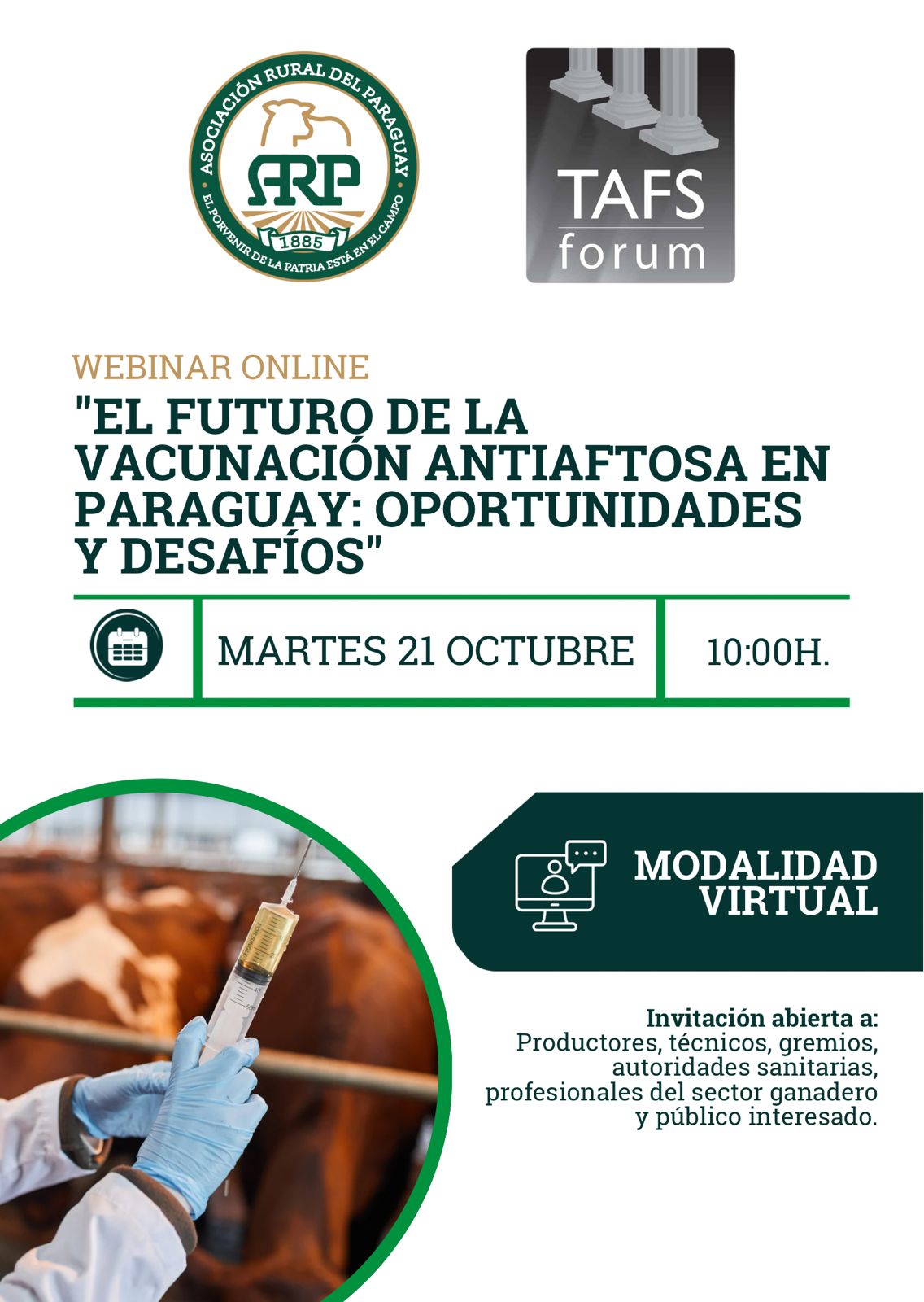

The regional conference “Strengthening Capacity to control FMD and Tackle Emerging Threats” held on June 3–4, 2025, in Istanbul, Türkiye, brought together over 60 stakeholders from public and private sectors across northern Africa and the Middle East.
The two-day event fostered the exchange of knowledge, expertise, and best practices, providing a valuable platform to assess the FMD landscape and reaffirming public–private commitment to more coordinated, adaptive control strategies.
FMD is a dynamic threat that requires constant vigilance and adaptable control strategies.
High-quality vaccines are essential for effective FMD control, requiring accurate antigen matching, a reliable cold chain, and a stable supply.
Early detection and robust surveillance: commitment to disease reporting, reliable diagnostics, and data sharing are critical, especially in resource-limited settings.
Investment in FMD needs to be a Strategic Development Priority: it strengthens disease control infrastructure, boosts productivity and improves market access.
Sustainable progress in FMD control requires flexible, context-specific, impact-driven funding.
Holistic Benefits Beyond FMD: investments in FMD control strengthen animal health systems by improving awareness, services, prevention, and their overall resilience.
Public-Private Partnerships improve detection, expand vaccination coverage, and support sustainable development by combining public oversight with private innovation. Sharing risks and responsibilities is increasingly important, as traditional financing mechanisms become more constrained.
Regional collaboration is crucial for FMD control, as interconnected livestock systems require the harmonization of protocols and coordination of capacity building efforts.

Representatives from several countries provided updates on the current epidemiological situation regarding FMD, ongoing challenges and recommendations to enhance control efforts, offering key insights to improve vaccination, surveillance, and regional cooperation. Updates were provided by:


The session continued with insights from Donald King and Theodore Knight-Jones

The second session focused on the elements of effective strategies to control FMD, emphasizing the need for context-specific interventions and robust surveillance systems.





The fourth and final session highlighted the broader benefits of FMD control, including the strengthening of animal health systems and improved preparedness for other disease threats.




The conference ended with a group discussion about prioritizing FMD control amid other global challenges and funding constraints. It was generally agreed that long-term public–private partnerships (PPPs) and innovative solutions are essential to secure quality vaccines, diagnostics and develop critical infrastructure for managing FMD and other transboundary diseases.
Ulrich Kihm: The Evolving Threat of FMD - Global & Regional Perspectives
Abraham Sangula: Insights from stakeholders – Kenya
Aida Tlatli & Anissa Dhaouadi: Insights from stakeholders – Tunisia
Alemayehu Mekonnen: Insights from stakeholders – Ethiopia
Donald King: Foot-and-mouth Disease Spread and distribution
Theo Knight-Jones: Economic burden of FMD outbreaks on farmers & economies
Barbara Wieland: Understanding the risks
Shahin Baiomy: Strengthening Early Detection and Surveillance of FMD
Ahmed El Idrissi: Continuous update and adaptation of animal disease control
Ahmad Al-Majali: Elements needed for FMD control
Rodolfo Bellinzoni: High quality FMD vaccine Broad immunological cross-reactivity
Min-Kyung Park: WOAH Int. Standards on FMD & the Standard-setting process
Thomas Jemmi: Beyond FMD - Broader Benefits of FMD Control for Animal Health Systems
Bouda Vosough Ahmadi: Living with FMD - Towards Smart, Stage-Adapted & Sustainable Control
Melissa McLaws: A regional approach to confront FMD
Patrik Buholzer: The Role of Public-Private Partnerships in Disease Control
Bouda Vosough Ahmadi: Financing and Resource Mobilization - From Cost Burden to Investment Opportunity
If you have any questions, don’t hesitate to contact us!

The regional conference “Foot-and-Mouth Disease Prevention: Safeguarding Livestock, Livelihoods, and Economies” held on March18–19, 2025, in Curitiba, Brazil, brought together over 120 stakeholders from public and private sectors across South America. The two-day event focused on enhancing emergency preparedness for FMD control, with particular emphasis on prevention and risk mitigation strategies. Only through working together and by joint efforts can the progress made in the fight against FMD throughout South America be secured.
Strengthening disease preparedness is essential for effective FMD control.
A resilient livestock sector depends on the active involvement of all stakeholders, both form the public and private sectors.
Understanding and regularly updating risk analyses is critical to informed, proactive decision-making.
Prevention, preparedness, and control must go hand in hand to ensure long-term resilience.
Cross-sector collaboration is vital for achieving sustainable disease control outcomes.
The first session addressed the continued global threat of FMD.



The second session focused on emergency preparedness strategies.




The final session emphasized the importance of regional cooperation in FMD control.


Participants agreed that joint efforts between the public and private sector and regional cooperation are key to strengthening FMD prevention.
The event closed with a strong call to action: preparedness today means resilience tomorrow!
Patrik Buholzer: Global FMD situation update
Beate Conrady: The impact of an FMD outbreak in Europe
Jorge Bonino: The impact of an FMD outbreak in South America
Andrés González Serrano: Understanding the risk
Nadav Galon: How can we detect an outbreak at an early stage?
Otamir Cesar Martins: Practice for the emergency
Barbara Porter-Spalding: Essential components robust FMD preparedness plan
Rodolfo Bellinzoni: Strategic vaccine reserves
Pedro Moura: Benefits of FMD free statuses; what is needed to sustain them
Jaime Romero: Challenges and strategies for regional collaboration
Patrik Buholzer: Keeping animal diseases at shore in a changing world
If you have any questions, don’t hesitate to contact us!

The TAFS conference in Madrid, Spain, on November 5th, 2024, brought together representatives from the public and private sectors of Iberian and North African countries. The day’s discussion sessions and presentations focused on emergency preparedness, control and prevention of FMD.
The recent FMD outbreaks and emergence of new FMD strains in North Africa underline how important it is to continuously invest in disease control and emergency preparedness. Effective control of transboundary animal diseases requires regional cooperation among all stakeholders, from the public and private sectors. Continuous adaptation and updating of control strategies is essential to prevent virus incursions and to respond quickly and effectively in case of an outbreak.
Raising awareness, informing stakeholders and emphasizing the importance of preparedness is essential, especially for European nations that have been FMD-free for decades. An early detection of an FMD incursion is vital for the livestock sector.
During the TAFS conference, it became evident that regular exchanges of information, expertise, and experiences among countries and stakeholders are essential to foster cooperation and mutual support in animal disease control. Only together, with a reginal approach, can diseases such as FMD be successfully tackled and controlled. Participants acknowledged the value of the TAFS platform for facilitating this direct exchange and encouraged the organization of similar events in the future.
The first session focused on disease prevention and preparedness.


The second session focused on the FMD situation in North Africa and the increased risk of its introduction into Portugal and Spain.



The third and final session focused on collaborative efforts to control FMD.

Karima Ouali, Fabrizio Rosso and Dónal Sammin: Understanding the risk of FMD
Lukas Perler: The importance of preparedness
Ahmed El Idrissi: Elements of Disease Control And Prevention
Pedro Moura: Global FMD situation update
Patrik Buholzer: The Impact of Animal Movement and Trade on the Spread of Diseases
Germán Cáceres Garrido: Insights from stakeholders – Spain
Yolanda Vaz: Insights from stakeholders – Portugal
Graça Mariano: Insights from stakeholders – Portugal
Anissa Dhaouadi and Aida Attia: FMD Epidemiological situation in Tunisia
Germán Cáceres Garrido: Impact of an FMD outbreak in Spain
In late October 2024, the TAFS Forum presented its scientific poster “Why the Two FMD-Free Statuses Should Be Treated as Equivalent” at the EuFMD Open Session 2024 in Alcalá de Henares, Spain. This work is a collaborative effort by the TAFS Forum, SAFOSO, Fundación Prosaia, and CONICET, to emphasize the need for a paradigm shift in in the recognition of the two FMD free statuses as equivalent.
Listen to the audio presentation of the poster Link.


The TAFS Conference on "Sustainable Control of Foot and Mouth Disease (FMD) in a Changing Environment" was held on July 29, 2024, in Buenos Aires, Argentina. The event brought together over 90 representatives from the public and private sectors across South America, including international experts and representatives from various countries, to discuss sustainable strategies for controlling FMD in the face of evolving global challenges.
The conference featured three key sessions:
The conference concluded with a podium discussion where participants shared their views on the future of FMD control in South America. There was a strong consensus on the importance of proactive preparation, regular risk assessments, and enhanced communication to effectively manage potential outbreaks.
The TAFS conference was acknowledged by participants as very valuable and successful. It provided a valuable platform for stakeholders to share knowledge, discuss challenges and identify opportunities to improve FMD control in the region. The conference highlighted the importance of continued collaboration, proactive risk management and sustained vigilance to both keep the region FMD free and ensure global food security, especially in the context of a rapidly changing environment.

The first session was focused on the current FMD situation in South America.

The second session was focused on the changing FMD situation in South America.


The session was concluded with a podium discussion where the conference participants shared their own views on the topics presented and discussed them with the speakers.


The second session concluded with a discussion in which participants shared their views on sustainability in extensive meat production, how local organizations are addressing sustainability issues, consumer demands and areas for improvement.

The third session focused on the need to prepare for the future challenges arising from the changed FMD situation in South America.

The conference was concluded with a podium discussion about the future of disease control in South America. The participants shared their views on the topics presented and discussed what should be done soon to ensure sustainable disease control.

Alejandro Schudel: El efectivo control de la fiebreaftosa en un escenario cambiante
Ricardo Reilly Arrarte: Fiebre Aftosa Oportunidades y Acceso a mercados de Uruguay, país libre con vacunación
Pedro Moura: Global FMD situation update
Emilio A. León: Una situación cambiante en Sudamérica: Impacto epidemiológico
Alejandra Capozzo: Reflections on strategies to adapt the Latin American Scientific Sector to FMD control
Jim Roth: Factors to Consider in an Outbreak of FMD in a Country that is FMD Free Without Vaccination
Leopoldo Estol: Producción de carne bajo presión
Patrik Buholzer: Increasing Disease Pressure - A Global overview
Nadav Galon: How veterinary authorities deal with evolving risks and the impact of new technologies
Jim Roth: Learning From Others: The U.S. Plans for an FMD Response
Nadav Galon: Increasing Resilience of Livestock Production
Rodolfo Bellinzoni: La Vacuna Antiaftosa y Bancos de Antígenos como herramientas para prevenir y controlar la FA

Abstract: Foot-and-Mouth Disease (FMD) is still one of the most relevant animal diseases and remains of global concern. The World Organization for Animal Health (WOAH) has specified two sanitary statuses that assure freedom from FMD: a country or zone can be free from FMD either with or without vaccination. To obtain either of the two statuses, absence of virus circulation must be shown. The standards set by WOAH are used for trade negotiations. During recent decades, different tools and approaches were developed to control FMD, including vaccines, diagnostics, and the Progressive Control Pathway for FMD. These tools improved over time, and nowadays high-quality, reliable vaccines and specific diagnostics are available to efficiently control and detect the infection, even in vaccinated populations. Due to these improvements, it is no longer justifiable to treat the two FMD-free statuses differently. The distinction between the statuses provides wrong incentives and tempts countries to take increased risks by stopping vaccination to improve their trade conditions, which can have potentially devastating consequences. The decision to stop vaccination should only be made on the basis of a careful and comprehensive analysis of the local and regional epidemiological situation. This paper presents the perspective that member countries and WOAH should recognize the two FMD-free statuses as equivalent.
Authors: Pedro Moura, Ulrich Kihm, Alejandro Schudel, Ingrid Bergmann and Patrik Buholzer
Publisher: MDPI: Veterinary Sciences, Section Veterinary Microbiology, Parasitology and Immunology
Date: May 2024
You can find the full article at the Link

The TAFS Roundtable on “FMD vaccine quality and potency verification”, held in Madrid on November 23, 2023, brought together animal health experts from Europe and South America to discuss reliable methods for assessing FMD vaccine quality and potency. After the introductory presentations by Dr.Michel Lombard (formerly Merial and WOAH) and Dr. David Mackay (EU-FMD), the participants discussed the current challenges and latest innovations in the verification of FMD vaccines. An important point of discussion was how to make vaccine verification more accessible, especially for countries with limited resources.
FMD vaccines are traditionally tested on animals, which presents challenges in standardizing tests, managing logistics, and addressing animal welfare concerns. Ongoing research is exploring alternative methods such as ELISA tests based on the 146S fraction, to simplify and expedite vaccine potency assessments. There is a pressing need for quick and straightforward methods to evaluate vaccine characteristics, enabling independent verification by governments, particularly in resource-limited countries.
The reliability of information provided by vaccine manufacturer regarding FMD vaccine characteristics, such as shelf life and stability, is often questionable. Resource-constrained countries face difficulties in independently verifying this information, leading to a heavy reliance on manufacturers. The World Reference Laboratory has reported an increase in requests for vaccine testing, underscoring the growing demand for independent verification. Establishing an impartial platform that consolidates data on vaccine quality, potency, and suitability would aid governments in making informed choices for their FMD control programs.
The emergence of FMD virus strains complicates the selection of appropriate vaccine strains. Unnecessary changes to vaccine formulations in response to these emerging strains can increase costs, potentially reduce efficacy, and may even contribute to virus evolution. It's crucial to assess whether existing vaccines remain effective against these emerging strains. Cross-protectivity testing, typically conducted within the FMD reference laboratory network, provides essential insights, which are then shared with veterinary authorities. Often, vaccine strain changes are not needed, and there is a need to effectively disseminate this information to prevent unnecessary modifications.
The roundtable identified several keyactions that would enhance vaccine quality and potency evaluation, supportingmore informed decision-making regarding suitable vaccines:
I. Creation of an Independent Vaccine Information Platform
The development of a platform providing unbiased data on vaccine quality and potency is essential to support veterinary authorities in their FMD vaccination campaigns, particularly in resource-limited countries. This platform would consolidate information from diverse sources, primarily independent of manufacturers, such as publicly available data and information from the World Reference Laboratory. Verified information from vaccine producers can also be integrated to enhance the platform's comprehensiveness.
II. Development of simple and rapid assays for vaccine quality verification
There is a clear need for the development and promotion of simple, rapid assays to verify vaccine quality at batch level. Ongoing research on the 146S antigen fraction shows promise in simplifying vaccine potency testing, potentially eliminating the need for animal-based methods. Such advancements would be particularly beneficial for countries with limited resources, enabling them to independently verify vaccines, contributing to global FMD control efforts.
TAFS will continue to support and advocate for simpler, more accessible methods to verify vaccine quality and potency, ensuring that high-quality vaccines are available to all.



Michel F. Lombard: History, current status of vaccine quality & potency
David Mackay et al.,: Assuring the quality of vaccines against Foot-and-Mouth Disease Current challenges and opportunities

On the 17th and 18th of November 2023, the TAFS Conference on "Importance of vaccines, diagnostics, and appropriate surveillance systems in disease control" was held in Abu Dhabi. The regional event brought together representatives from the Middle East, North and East Africa, as well as industry stakeholders and international animal health experts. During 5 sessions over the course of two days, the participants discussed and shared experiences on transboundary animal diseases (TADs), focusing on the control and surveillance measures implemented, and the importance of using appropriate tools and control strategies.














Patrik Buholzer: Animal disease emergencies in a globally interconnected world
Ahmad Almajali: Regional epidemiological situation on TADs of ruminants
Sabri Hacıoglu: Transboundary Animal Disease Control Measures in Türkiye
Muhammad Afzal: Transboundary Animal Diseases of Ruminants in Pakistan
Tariq Taha: Animal Diseases Challenges in the Middle East & North Africa
Shahin Baiomy: EuFMD's Initiatives in TADs Control: Vaccines, Diagnostics, and Surveillance Systems
Bouda Vosough Ahmadi: Reflection on the economic impact of animal diseases
Amjad M. Darwish: Importance of Animal Identification and Traceability in Disease Control
Said Masri: High Health Livestock Export Zone (HHLEZ): Operation Manual
Ulrich Kihm: Regional and global success stories in animal disease control
Ana Taffarel: Successful FMD control – The South American example
Ahmed EL Idrissi: Importance of quality vaccines and appropriate approaches to disease control – An overview
Rodolfo Bellinzoni: FMD Vaccine Concept of Quality -The Importance of a Well Validated Product Sustainability Across Different Regions and Along the Time
Berecha Bayissa: Importance of Quality Vaccines, Experience in the East Africa Region
Ahmad Almajali: Importance of quality vaccines, experience in the MENA region
Ulrich Kihm: Why is there a need for change in animal disease control
Pedro Moura: TAFS current work towards an FMD Paradigm shift and why it also matters for the region
Amanda Hodges: Mitigating the risk of exotic disease incursion in Australia
At the TAFS FMD Conference "Towards a paradigm shift on the FMD-free with vaccination status" in Bangkok on the 4th of August 2023, representatives from the public and private sectors of Asian countries gathered with international animal health specialists. The conference's main objectives were to talk about the present FMD epidemiological situation, control and surveillance techniques, and the need for a paradigm change regarding the FMD-free with vaccination status.

The day's first session centered around the issues associated with FMD control under the current epidemiological scenario.
Patrik Buholzer (TAFS Forum) gave a summary of the most significant animal disease-related events on a global scale. Patrik emphasized that due the increasing global commerce, global warming, and other elements of growing concern, a comprehensive strategy that integrates technology advancements is required to control diseases such as avian influenza, African swine fever, and foot-and-mouth disease.
An overview of the latest FMD outbreaks and an update on the disease's global epidemiological developments were provided by Dr. Nadav Galon (former CVO of Israel). To monitor and manage FMD, Nadav underlined the significance of high-quality diagnostics and vaccines. Highlighting that in a population at risk, where vaccines are not easily accessible to limit viral transmission, an FMD virus introduction can be disastrous. Using the recent arrival of SAT2 FMD serotypes into the Middle East region as an example, Nadav also stressed that conventional endemic viral pools are no longer consistent and that new FMD serotypes are expected to be detected outside of their original pool more often than in the past.


The local challenges in FMD control were highlighted in the session's final three presentations.
In addition to providing an update on the FMD epidemiological situation in Thailand, Dr. Boonsuya Seeyo Kingkarn from the Regional Reference Laboratory for FMD in Southeast Asia (RRL) also presented Thailand's national FMD management strategy.
Even though the Philippines have been free of FMD without vaccination since 2015, a strict surveillance plan is in place due to the Southeast Asian epidemiological environment. A report on the Philippines' FMD emergency preparedness plan was given by Dr. Arlene Asteria Vytiaco, assistant director of the country's Bureau of Animal Industry and national coordinator / focal point for SEACFMD.
Dr. Raphee Panyathong, Director of Swine Veterinary Service in the North Area of CP (Charoen Pokphand), discussed the difficulties producers face when attempting to control FMD.



The technological advancements in vaccines and diagnostics were the topic of the second session of the day.
From a variety of angles, the significance of high-quality vaccines and diagnostics was discussed. Dr. Filip Claes (FAO) and Dr. Karma Rinzin (WOHA) shared their perspectives as representatives of the international organizations they represent, Dr. Rodolfo Bellinzoni (Biogenesis Bago) provided the perspective of a vaccine producer, about the importance of high-quality standards, and Dr. Nadav Galon presented the main considerations that the national responsible authorities must consider when choosing an FMD vaccine.
A discussion of FMD control tools was held at the end of this session. Participants unequivocally agreed that reliable, high-quality vaccines and diagnostic tests, along with effective surveillance and control programs, are the essential pillars for FMD control and surveillance.
The final session's main topic was the need for a paradigm shift that recognizes the FMD-free status with and without vaccination as equivalent. Dr. Pedro Moura (SAFOSO) outlined the main points of the position paper and invited participants to share their experiences and thoughts on the subject after.
The need for a paradigm shift and the participants' points of view on the subjects were exchanged during a lively discussion.






Patrik Buholzer: Animal disease emergencies in a globally interconnected world
Nadav Galon: FMD Global Situation Overview
Kingkarn Boonsuya Seeyo: Update on the current FMD Situation in Thailand
Arlene Asteria V. Vytiaco: The FMD emergency preparedness plan of the Philippines
Filip Claes: Importance of reliable diagnostics
Karma Rinzin: Effective control of FMD through application of WOAH standards - Focused on surveillance and use of good quality vaccines
Rodolfo Bellinzoni: FMD Vaccine Concept of Quality - The Importance of a Well Validated Product Sustainability Across Different Regions and Along the Time
Nadav Galon: Quality Vaccines Selection for a National Control Program National Competent Authority Perspective
Pedro Moura: Why FMD free with vaccination should be equal to FMD free without vaccination
On the 1st and 2nd of June 2023, representatives from Asia region and international experts came together at the TAFS FMD Conference “Towards a paradigm shift on the FMD-free with vaccination status” in Seoul. They discussed the current FMD situation, control and surveillance measures and the need for a paradigm shift on the FMD-free with vaccination status.
The first day emphasized the current state of animal disease with a focus on FMD. Professor Dr. James Roth from Iowa State University spoke about the significance of being prepared for animal disease emergencies as well as the current problems we are facing. James explained to us the risks associated with the global spread of avian influenza as well as the most recent developments with ASF.

Dr. Donald King from the Pirbright Institute gave an overview of recent FMD-related events and a status report on the epidemiological situation of the disease around the world, highlighting the value of high-quality diagnostics and vaccines as tools for monitoring and controlling FMD. He also drew attention to the recent introduction of the SAT2 FMD serotypes into the Middle East region, underlining that when the FMD virus finds a naive population and vaccines to support the control its spread are not widely accessible, such an incursions can have catastrophic effects.

In the last session of the day, the FMD situation in three Asian countries and the challenges associated with controlling the disease were presented. The audience was particularly interested in Dr. Song-Ha Chas' update on the FMD situation with the recent outbreaks in South Korea. Dr. Duc-Huy Chu provided an overview of the FMD situation in Vietnam and the approach used to control it. Dr. Siti Yulianti of Indonesia discussed the 2022 FMD virus incursion as well as the strategy and difficulties for controlling the FMD situation.



All of the participants shared their experiences and thoughts about what they had heard as the day came to a close in a lively discussion.
Professor Dr Ulrich Kihm’s presentation about the history of FMD control on the second day of the conference highlighted the importance of the scientific progress achieved in controlling FMD over the last decades. He emphasized the significance of FMD vaccines for the prevention and elimination of this disease across Europe, including significant improvements that have been achieved.

Dr. Jorge Bonino Morlan from Uruguay explained how they have been successfully managing FMD. He emphasized the key components of the South American FMD control model, as well as the trade opportunities it has been created for Uruguay. He also demonstrated what other countries and regions could learn from Uruguay.

Following that, the significance of high-quality diagnostics and vaccines was discussed from various angles. Drs. Filip Claes (FAO) and Karma Rinzin (WOHA) provided us with the perspective of an international organization, Dr. Rodolfo Bellinzoni (Biogenesis Bago) provided us with the perspective of a vaccine manufacturer, and Dr. Nadav Galon (former CVO of Israel) provided us with the perspective of a nation that has been using FMD vaccines for a long time.




There was a clear consensus that effective FMD control and surveillance depends on reliable diagnostics and high-quality vaccines, as well as sound surveillance and control plans.
The afternoon was dedicated to the need for a paradigm shift in the recognition of the FMD-free with vaccination status as equivalent to FMD-free without vaccination. Following the presentation, the key elements of the position paper on the FMD paradigm shift (Position Paper) were presented by Dr Pedro Moura (SAFOSO), all of the participants engaged in a lively, interactive discussion.


It can be concluded that the TAFS FMD conference “Towards a paradigm shift on the FMD-free with vaccination status” was a great success. It laid the basis for further discussions and exchange in the region, as well as the way forward towards a paradigm shift of the FMD-free with vaccination status. FMD-free is FMD-free regardless of the vaccination status.
James Roth: Animal Disease Emergency Preparedness-New Challenges
Donald King: Overview of recent global FMD events
Sang-Ho Cha: FMD situation in Republic of Korea Control & Prevention
Siti Yulianti: FMD situation in Indonesia
Duc-Huy Chu: FMD situation and control in Vietnam
Ulrich Kihm: History of FMD control
Jorge Bonino Morlán: FMD control in South America
Karma Rinzin: Effective control of FMD through application of WOAH standards - Focused on surveillance and use of good quality vaccines
Filip Claes: Importance of reliable diagnostics
Rodolfo Bellinzoni: FMD Vaccine Concept of Quality - The Importance of a Well Validated Product Sustainability Across Different Regions and Along the Time
Nadav Galon: Quality Vaccines Selection for a National Control Program National Competent Authority Perspective
Pedro Moura: Why FMD free with vaccination should be equal to FMD free without vaccination
The emergence of FMD viral strains outside of their original pools is a challenge for regional livestock production systems due to the lack of cross-immunity between viral serotypes, which may result in a lack of herd immunity for the emerging FMD viral strain, even in regions where there is control through vaccination. These events, highlight the importance emergency preparedness, establishing an early disease detection system and regular review and adjustment of vaccine matching.
The most recent events related to FMD serotype jumps in Jordan and Iraq prompted FAO to issue an emergency alert in order to prepare countries in the Middle East and West-Eurasia for an eventual incursion of FMD SAT-2, which has only been detected in the region on rare occasions.
Please find attached an overview of recent events in Egypt and the Middle East related to FMD viral strain jumps and the challenges these may represent.

On December 7th, 2022, the TAFS Forum held a virtual meeting, with the support of Foro Mercosur de la Carne, on the need for a paradigm shift of the official FMD-free with vaccination status.
About60 participants attended the event, including representatives from the livestock industry, academia, governmental institutions from all over South America and international organizations.
Following a stakeholder workshop held in Buenos Aires, in April 2022 and a virtual workshop with members of Foro Mercosur de la Carne in August 2022, this was the third event organized by TAFS on this topic.
In this virtual meeting, the different South American stakeholders were updated on the global FMD epidemiological situation, and the progress made towards the achievement of a paradigm shift of the perception of the FMD-free status with vaccination. The invited speakers explained, from different perspectives, why a change of paradigm is not only reasonable and necessary, but also why there are no longer any scientific reasons to distinguish between the two FMD-free statuses, with or without vaccination. During the open discussion at the end of the virtual meeting, all the participants agreed that there are no reasons to treat the two statuses "FMD-free with vaccination” and “FMD-free without vaccination" differently and that “FMD-free is FMD-free, regardless of vaccination status.”

On 27-28 April 2022, the TAFS Forum organized a “Workshop on a Paradigm shift of the ‘FMD-free with vaccination’ status” in Buenos Aires, Argentina with the support of Fundación PROSAIA, Confederaciones Rurales Argentinas, Asociacion Rural del Uruguay and Consorcio de Exportadores de Carnes Argentinas.
The objective of the workshop was to initiate a discussion among stakeholders from the meat industries in Argentina, Bolivia, Paraguay, and Uruguay on the equivalence of the “FMD-free with vaccination” status to the “FMD-free without vaccination” status. In the workshop, a position paper that provides the justifications for why the “FMD-free with vaccination” status should be considered to have equivalent safe sanitary value as the “FMD-free without vaccination” status was discussed in detail for agreement and improvement.
It was the first workshop of additional workshops to follow to continue the discussion with international stakeholders and to determine the way forward towards equivalency between the “FMD-free with vaccination” and the “FMD-free without vaccination” statuses.
The TAFS Forum is organizing a workshop on a paradigm shift in the global perception of the “FMD-free with vaccination” status with the support of PROSAIA, CRA, and ABC in Buenos Aires, Argentina, on 27-28 April 2022.
The purpose of the workshop is to initiate a discussion among regional actors in the production and meat value chain on the equivalence of the "FMD-free with vaccination" status to the “FMD-free without vaccination” status. Stakeholders in South America are invited to discuss topics such as the advantages and disadvantages of opening trading markets with countries that are “FMD-free with vaccination” and the safeguards that would need to be in place.
It is the first workshop of additional workshops to follow to continue the discussion with international stakeholders and to determine the way forward.
For more information on the event, please contact Patrik.Buholzer@tafsforum.org.
While Foot-and-Mouth Disease (FMD) remains a concern of global economic importance, changes in approaches to FMD control are needed in the context of global food security.
Even though stamping out has been a mainstay off control for some countries in the past, the public is less-and-less willing to accept the mass culling of healthy animals.
The animal welfare and waste of protein considerations make stamping out an unsustainable disease control method.
The TAFS forum is seeking new members. If you are interested, please contact us and describe what you might be able to contribute to the TAFS forum. We look forward to hearing from you.